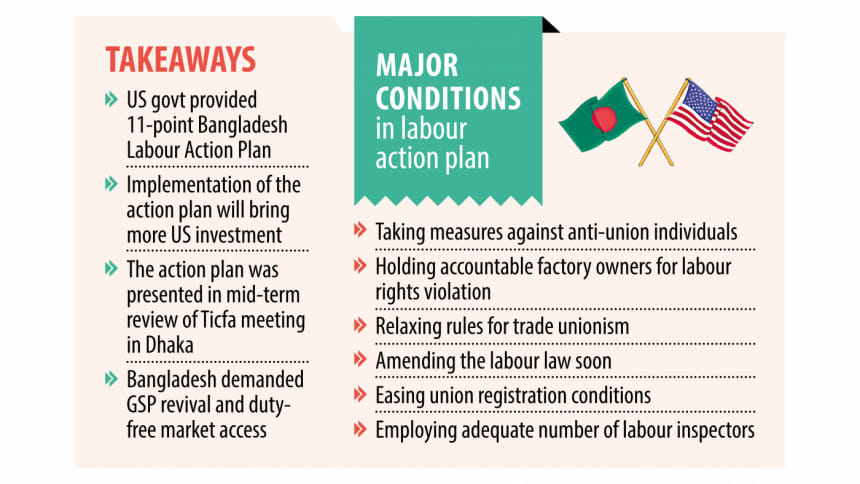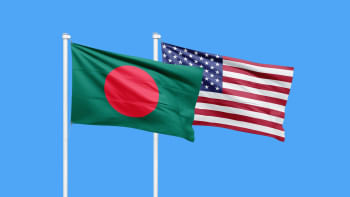US sets 11 conditions for more investment in Bangladesh

The Biden administration yesterday informed of 11 conditions under a "Bangladesh Labour Action Plan" which Bangladesh has to comply with in order to secure more US investment.
Visiting senior officials of the United States Trade Representative (USTR) handed over the "Bangladesh Labour Action Plan" to Senior Commerce Secretary Tapan Kanti Ghosh at the ministry in Dhaka.
This took place during a meeting to review the seventh round of a Trade and Investment Cooperation Forum Agreement (Ticfa) meeting held in Dhaka last September.
Bangladesh and the US had signed the Ticfa on November 25, 2013 to establish an annual forum to identify and address obstacles to increasing bilateral trade and investment.
Yesterday Ghosh led the Bangladesh side while Brendan Lynch, assistant US trade representative for South and Central Asia at the USTR, led the US side.
The first condition is that Bangladesh has to take meaningful actions to prevent and hold violators accountable for acts of violence and harassment against union organisers, workers, and legal protest activities.
Moreover, Bangladesh has to drop or resolve criminal charges against labour activists and publicly announce credible actions taken.
The second condition is for holding accountable factory owners, management and private individuals for conduct that violates workers' rights provided by Bangladesh labour act.
Bangladesh has to investigate and resolve specific alleged cases of unfair labour practices by employers, and improve access to justice for workers and trade unions for anti-union discrimination, retaliation, and other unfair labour practices.
Thirdly, Bangladesh has to amend the Bangladesh labour act in consultation with the International Labour Organization (ILO) to be consistent with international labour standards on freedom of association and collective bargaining.
Moreover, Bangladesh has to lower the percentage of workers required to form a trade union from the present 20 percent to stay consistent with international labour standards and repeal provisions that call for cancellation of a trade union if it falls below the minimum threshold.
The law should bear a provision allowing trade unions to have access to the official number of workers when attempting to form a trade union.
Legal action should be taken against employers failing to maintain such a register and for limiting registration requirements for personal information to factory ID card with a number, national identity card, or birth registration certificate.
Bangladesh should withdraw the requirement that a union has to hold two general meetings with participation of all members to form a trade union and submit a constitution in order to register.
It should increase fines for employers who commit anti-union discrimination and unfair labour practices, and clarify that the blacklisting of workers is prohibited as an unfair labour practice and that workers and unions can directly file unfair labour practices cases with Bangladesh labour courts.
The American government also sought elimination of excessive restrictions on the right to strike and severe penalties for illegal strikes.
Fourthly, the USTR asked for revising the Bangladesh labour rules to ensure that they are consistent with the amended Bangladesh labour act.
Bangladesh demanded duty-free market access for goods, especially garments made from imported cotton, Ghosh said.
Bangladesh also demanded investment from the US International Development Finance Corporation and simplifying the procedure for pharmaceuticals product registration to the US.
Earlier, the then Obama administration also provided a 16-point Bangladesh Action Plan in 2013 when the Generalised System of Preferences (GSP) status was suspended for Bangladesh over poor labour rights and workplace safety.
Bangladesh has already submitted the progress report on complying with the 16-point conditions but the GSP is yet to be reinstated.

 For all latest news, follow The Daily Star's Google News channel.
For all latest news, follow The Daily Star's Google News channel. 








Comments